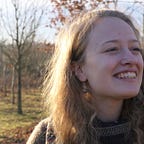#388: The Bernardine Evaristo Interview
Finding a lost audio recording from the little-known past
When I first saw Bernardine Evaristo’s name on the Booker short list back in 2019, it rang a bell. I wondered — is that the woman I interviewed way back when? Girl, Woman, Other sounded like such a different book to the one I had read… but it was her. I had her novella, Hello Mum, on my shelf, and I had a blank Word document on my computer. That document was all that remained of the never-written transcript of the interview I had with her in 2010, when I was a keen, fortunate, and nervous teenager.
At the young and naive age of 14, I interviewed Bernardine Evaristo in my village church. It was for our local arts festival, where our village read was Hello Mum. It’s a novella, short and tragic, detailing gang violence in London — a world away from my teenage experience in the countryside. Evaristo came and did a book event in the church to a room full of people, and then I got to sit in a pew with her and ask her questions. I managed the interview, but when it came to writing it up, I was lost. I could not think how to begin, and in the middle of high school life, it was forgotten. When I saw her name on the Booker list and remembered that moment from nearly ten years before, I tried to find the recording, but it was missing. All I had was that blank document, glaring back at me.
But then, more recently, my mother managed to find it, buried somewhere on her laptop, and she sent it to me out of the blue. I opened that unexpected email, and suddenly I was transported back to my teenage years, to that pew in that church. I listened to my voice, at first restrained with nerves, but later loosening. And I listened to Evaristo, being her welcome, sociable self, as she talked about writing to a young girl who loved books and words, a girl who never would have imagined where she’d be now, in 2022.
Listening to that interview today, 12 years after the fact, I hear my 14-year-old self and write this as my 26-year-old self. I am in the 20s that Evaristo said in that interview could be the time that I start writing. And I am writing — though no novels (yet). The interview is short, sweet. It cuts off just as it starts getting interesting, when the interview ends and I just get to hear Evaristo talk to a 14-year-old girl who loves books. But there are some nuggets there in that audio recording, pieces of advice which, when heard or read now, are especially poignant considering how far Evaristo has come from that little local book affair.
The first of Bernardine Evaristo’s writing tips from 2010 is simple, yet often forgotten: if you want to write, then write. And remember to read a lot and, perhaps more importantly, read widely:
“Don’t just read the books that you naturally read, stretch yourself and read some of the more difficult books. Read international fiction, if it’s fiction you want to write.”
The next tip is the poignant one, writing this after Evaristo’s rise to fame:
“Remember that it’s a long career. A lot of people want to write something and get published and get a lot of money straight away. But it’s actually a career that you want to last a lifetime. You develop your craft and hopefully get better as you mature.”
Following on from that, Evaristo reminded little young me to remember I was 14, so the key thing then was to start writing, and keep it up:
“If you’re really interested, you might study English at university, you might go and do a creative writing MA after that, if you feel you need to, and by the time you’re in your 20s, you might start writing something that might find a publisher.”
Well, I’m in my 20s now, and I’m still writing — here’s the proof. I have my English degree, I have an MA (though not in creative writing), and now I’m writing the mega dissertation: a PhD. The question is, do my free-time scribbles of creative writing show the promise of something publishable? Perhaps this is the decade for me to ask that question.
One of my final questions was whether she had a message she wanted to put in her books. Reading it now, after all of the books she’s written, she’s succeeding, not just in the message, but in maintaining her creative focus:
“I feel passionately about having an equal society. I feel passionately about injustice. But I don’t approach my work looking at that. I just think of the kinds of issues, the kinds of stories, that I’m interested in. The idea is to not write about it as if it’s an issue but to write about, and express it through, the characters. So the characters come alive. The stories that I’m very interested in telling are the stories that don’t get told.”
The interview recording that I have finishes mid sentence, with Evaristo giving my 14-year-old self encouraging comments on my interview style, comments which cut off just as I want to hear more. I’m sorry I did not write that interview up when I did it, but here are her nuggets of wisdom, shared now, and still just as relevant 10 years down the line. And you know what? Just as it’s amazing to see how far Evaristo has come, it’s nice to see how far I’ve come — how much I’ve written, how much I’ve read, and how much more there is left to write.
